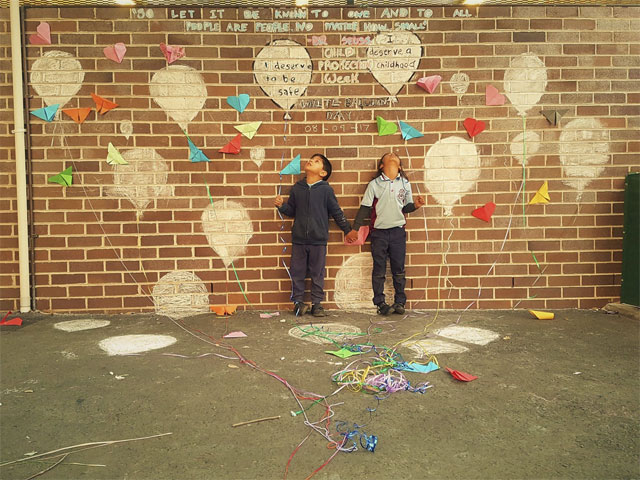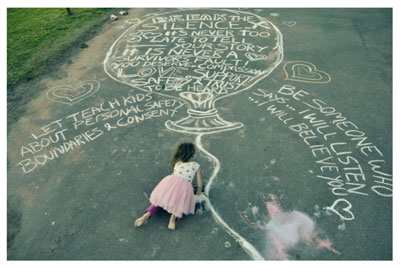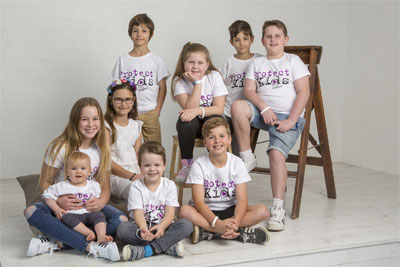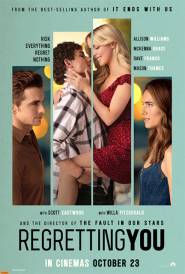Bravehearts National Child Protection Week

Child Protection Is Everybody's Business – White Balloon Day Helps Protect Our Kids
White Balloon Day is Friday September 7th, during National Child Protection Week (2nd - 8th of September, 2018)
Every 90 minutes a child is sexually assaulted in Australia - that's 1 in 5 children who are sexually assaulted in some way before their 18th Birthday – a statistic that is totally unacceptable in Australian society.
Bravehearts' annual White Balloon Day (endorsed and funded by the Department of Social Services National Initiatives), is Australia's longest running and only annual national campaign to increase community awareness of child sexual assault to prevent a crime currently affecting more than 58,000 children across Australia, every year.
The importance of supporting Bravehearts' national White Balloon Day campaign in preventing child sexual assault and the flow-on destructive impact it has on communities throughout Australia, cannot be overstated.
While the Royal Commission into Institutional Responses to Child Sexual Abuse has smashed the wall of silence surrounding cases of child sexual assaults in institutional environments; sadly the majority of these crimes are perpetrated inside the family unit or by someone known to the family.
Hetty Johnston AM, Founder and Executive Chair of Bravehearts said "Increasing awareness of child sexual assault through White Balloon Day (now in its 22nd year) during National Child Protection week, is critical.
"Child protection is everybody's business - because it takes a village to raise a child, an entire community of adults and stakeholders, and we must work together to better protect our children and allow them to grow up safe from harm.
"With rates of child sexual assault and exploitation in Australia remaining at crisis levels, now more than ever before Bravehearts needs the support of communities and governments to help increase awareness to protect our children from a crime that breaks the little hearts and spirits of Australia's most precious treasures – our children," she said.
Of women who were victims, more than 90% knew the perpetrator with 55% being relatives. For male victims, more than 80% knew the perpetrator with 23% being relatives.
Compared to other recorded crimes against children under 19, the statistics of child sexual assault are shocking.
"Sadly, if we were to bring all these children together in one place, they would fill the MCG not once, but a staggering eight times – that is the tragic magnitude of this largely hidden crime against Australian children with the long-term damage caused estimated to cost the Australian economy between $13.7 to $38.7 billion," said Ms Johnston.
"While early disclosure can improve long-term outcomes for victims through counselling and support and lead to preventing further harm and potentially the prosecution of perpetrators; the majority of these crimes continue to go unreported and perpetrators continue to sexually assault children who suffer in silence, too afraid to disclose because they fear consequences or feel they don't have the opportunity to tell someone who can help them," Ms Johnston said.
"If a child discloses and is unsupported or disbelieved, this can cause children grave harm but reports have shown that 1 in 3 adults would not believe children if they disclosed sexual assault, while more than 1 in 4 have said they lack the confidence to recognise the signs of child sexual assault," she said.
"Child sex offenders are master manipulators, able to perpetrate this crime through the fear driven silence, secrecy and shame. While children feel shame, self-blame, embarrassment, guilt, responsibility and concern for their own safety or the safety of others, their suffering continues and the pain they suffer can last a lifetime.
"For those of us who do care; for those of us who do listen; the sound of their suffering is deafening," Ms Johnston said.
"Every Australian child has the right to feel safe and as a community, we have the responsibility to work together to protect our kids and raise them in an environment where they can feel safe."
"Recommendation 6.12 from the Royal Commission into Institutional Responses to Child Sexual Abuse has called on all levels of government nationally to help protect children in their communities.
"By working with Bravehearts and supporting national White Balloon Day we can help break the silence surrounding this crime to create child safe communities Australia-wide," said Ms Johnston.
Bob Atkinson AO APM, Former Commissioner for the Royal Commission into Institutional Responses to Child Sexual Abuse said, "As a long term supporter of Bravehearts, the community's support for White Balloon Day is vital!
"An individuals' safety underpins children's entire quality of life and is a right, not an option.
"While there is still much to do in that regard, Bravehearts is at the forefront of child protection and with widespread community support we will enable them to continue their important and valuable work," the Former Commissioner said.
 During National Child Protection Week everyone can help our children stay safe by participating in White Balloon Day and registering at whiteballoonday.com.au.
During National Child Protection Week everyone can help our children stay safe by participating in White Balloon Day and registering at whiteballoonday.com.au.
Bravehearts is Australia's leader in child protection offering specialised training services for government organisations, educators in schools and childcare centres, education and support services for children and their families, while parents and carers can download free child safe information resources from our website www.bravehearts.org.au.
Call our toll free Support Line on 1800 272 831 Monday to Friday between 8:30am to 4:30pm (AEST) or visit our website www.bravehearts.org.au.
For more information parents can download a free parent safety guide from https://bravehearts.org.au/personalsafety
Every 90 minutes a child is sexually assaulted in Australia - that's 1 in 5 children who are sexually assaulted in some way before their 18th Birthday – a statistic that is totally unacceptable in Australian society.
Bravehearts' annual White Balloon Day (endorsed and funded by the Department of Social Services National Initiatives), is Australia's longest running and only annual national campaign to increase community awareness of child sexual assault to prevent a crime currently affecting more than 58,000 children across Australia, every year.
The importance of supporting Bravehearts' national White Balloon Day campaign in preventing child sexual assault and the flow-on destructive impact it has on communities throughout Australia, cannot be overstated.
While the Royal Commission into Institutional Responses to Child Sexual Abuse has smashed the wall of silence surrounding cases of child sexual assaults in institutional environments; sadly the majority of these crimes are perpetrated inside the family unit or by someone known to the family.
Hetty Johnston AM, Founder and Executive Chair of Bravehearts said "Increasing awareness of child sexual assault through White Balloon Day (now in its 22nd year) during National Child Protection week, is critical.
"Child protection is everybody's business - because it takes a village to raise a child, an entire community of adults and stakeholders, and we must work together to better protect our children and allow them to grow up safe from harm.
"With rates of child sexual assault and exploitation in Australia remaining at crisis levels, now more than ever before Bravehearts needs the support of communities and governments to help increase awareness to protect our children from a crime that breaks the little hearts and spirits of Australia's most precious treasures – our children," she said.
Of women who were victims, more than 90% knew the perpetrator with 55% being relatives. For male victims, more than 80% knew the perpetrator with 23% being relatives.
Compared to other recorded crimes against children under 19, the statistics of child sexual assault are shocking.
"Sadly, if we were to bring all these children together in one place, they would fill the MCG not once, but a staggering eight times – that is the tragic magnitude of this largely hidden crime against Australian children with the long-term damage caused estimated to cost the Australian economy between $13.7 to $38.7 billion," said Ms Johnston.
"While early disclosure can improve long-term outcomes for victims through counselling and support and lead to preventing further harm and potentially the prosecution of perpetrators; the majority of these crimes continue to go unreported and perpetrators continue to sexually assault children who suffer in silence, too afraid to disclose because they fear consequences or feel they don't have the opportunity to tell someone who can help them," Ms Johnston said.
"If a child discloses and is unsupported or disbelieved, this can cause children grave harm but reports have shown that 1 in 3 adults would not believe children if they disclosed sexual assault, while more than 1 in 4 have said they lack the confidence to recognise the signs of child sexual assault," she said.
"Child sex offenders are master manipulators, able to perpetrate this crime through the fear driven silence, secrecy and shame. While children feel shame, self-blame, embarrassment, guilt, responsibility and concern for their own safety or the safety of others, their suffering continues and the pain they suffer can last a lifetime.
"For those of us who do care; for those of us who do listen; the sound of their suffering is deafening," Ms Johnston said.
"Every Australian child has the right to feel safe and as a community, we have the responsibility to work together to protect our kids and raise them in an environment where they can feel safe."
"Recommendation 6.12 from the Royal Commission into Institutional Responses to Child Sexual Abuse has called on all levels of government nationally to help protect children in their communities.
"By working with Bravehearts and supporting national White Balloon Day we can help break the silence surrounding this crime to create child safe communities Australia-wide," said Ms Johnston.
Bob Atkinson AO APM, Former Commissioner for the Royal Commission into Institutional Responses to Child Sexual Abuse said, "As a long term supporter of Bravehearts, the community's support for White Balloon Day is vital!
"An individuals' safety underpins children's entire quality of life and is a right, not an option.
"While there is still much to do in that regard, Bravehearts is at the forefront of child protection and with widespread community support we will enable them to continue their important and valuable work," the Former Commissioner said.
 During National Child Protection Week everyone can help our children stay safe by participating in White Balloon Day and registering at whiteballoonday.com.au.
During National Child Protection Week everyone can help our children stay safe by participating in White Balloon Day and registering at whiteballoonday.com.au. Bravehearts is Australia's leader in child protection offering specialised training services for government organisations, educators in schools and childcare centres, education and support services for children and their families, while parents and carers can download free child safe information resources from our website www.bravehearts.org.au.
Call our toll free Support Line on 1800 272 831 Monday to Friday between 8:30am to 4:30pm (AEST) or visit our website www.bravehearts.org.au.
For more information parents can download a free parent safety guide from https://bravehearts.org.au/personalsafety
Interview with Hetty Johnston AM, Founder and Executive Chair, Bravehearts
Question: What is Bravehearts?
Hetty Johnston: Bravehearts is Australia's leading voice for child protection and has been dedicated to protecting Australian children for 22 years. White Balloon Day is Australia's largest annual national campaign to raise awareness of and funds for, the prevention of child sexual assault.
Founded in 1997 by Hetty Johnston AM following her young daughter's disclosure of sexual assault, today Bravehearts is Australia's leading child protection organisation whose Vision is to make Australia the safest place in the world to raise a child.
To prevent child sexual assault, Bravehearts employs a dedicated team who work holistically to provide education and training programs, specialist counselling and support services, research, advocacy and lobbying while undertaking reform campaigns all aimed at preventing child sexual assault in our society.
Question: The statistics are alarming; "every 90 minutes an Australian child is sexually assaulted in some way before their 18th Birthday" – how can we, work together, to reduce this?
Hetty Johnston: The reality is that approximately 58,000 children every year are sexually assaulted, which equates to one child every 10 minutes in Australia ...but only in one in nine of those assaults will it be substantiated by authorities. Most will keep the offending a secret and many more will not be able to provide sufficient evidence to meet statutory thresholds for interventions or substantiations.
The good news is child sexual assault is, for the most part, preventable. We can do this through educating our children about their rights around personal safety and everybody else's rights around their own personal safety and by also upskilling our adults to recognise inappropriate behaviours and warning signs in other adults and in children. When we combine public education with ensuring our authorities respond appropriately when children do disclose, so they believe children, we will become a society that can reduce the incidence of child sexual assault.
Question: How can Australians break the silence of child sexual assault in Australia and worldwide?
Hetty Johnston: People everywhere need to talk about it. We need to understand that it is only the victims who know who the offenders are. The only ways to stop offenders from continuing to offend against other children is to know who they are.
We rely on victims and survivors to tell us who the offenders are so the authorities can intervene and stop them from hurting other children. People can do this obviously by speaking to police directly or if that is too difficult they can use the Bravehearts Sexual Assault Disclosure Scheme (SADS) which is an anonymous, but highly effective way to report people to police without identifying themselves. Bravehearts is the conduit of this information to police. To find out more go to the www.bravehearts.org.au/sads.
Question: How can parents approach sexual assault education with their own children?
Hetty Johnston: It is critically important every parent speaks with their children about this issue. There are ways you can do this without it being a difficult conversation or frightening to either the child or parent.
The Bravehearts Parents Guide provides tips for keeping children of all ages safe online and simple step-by-step activities for teaching children personal safety. It is based on Bravehearts' acclaimed Ditto Keep Safe Adventure program which has helped to educate almost 1 Million Australian children live and hundreds of thousands through Ditto In A Box with in personal safety since 2006.
Bravehearts' Guide, developed by education and research experts, gives parents and carers free access to easy-to-follow information for teaching children simple personal safety strategies. These strategies can help kids build confidence and resilience to protect themselves in a variety of situations across the span of their young lives, including online.
We cannot rely on children to protect themselves, they don't have the level of comprehension necessary to do so, but we can educate and empower them to trust their instincts so if they ever feel unsafe or unsure, they have your permission as a parent to remove themselves from that situation and feel 100% confident they won't get in trouble for doing so.
 Question: What are the tell-tale signs that a child may be being sexually assaulted?
Question: What are the tell-tale signs that a child may be being sexually assaulted?
Hetty Johnston: As children often lack the words to describe sexual assault, they find it exceptionally difficult to disclose. The more severe the degree of harm, the less likely it is that the child/young person will disclose. The fear of a negative reaction and possible punishment can also prevent children from speaking out.
Children may try to subtly open the conversation by asking "Do you like so and so?… I don't" or "I've got a secret". However, there are a number of physical and behavioural symptoms that indicate a child or young person may have been harmed. While physical and behavioural symptoms should be viewed as a sign that something may be worrying the child, it should NOT be automatically assumed that harm is occurring.
By talking to the child, this may reveal something quite innocent so be sure to speak with the child before making accusations.
What Parents and Adults Should Look For
Parents, teachers, carers, child protection workers, counsellors etc., all need to know the symptoms of child sexual assault so if there are significant changes in behaviour, increased fears, or physical symptoms, they can talk to the child to discuss what they might be feeling.
Common Indicators in Children
Fear of being hurt during nappy change or dressing.
Loss of concentration.
Development of eating disorders.
Fear of being alone with a particular person.
Sexual themes in artwork, stories, play etc..
Showing knowledge of sexual behaviour beyond their years.
Bedwetting or soiling after being toilet trained.
"Acting out" behaviours; for example, aggression, destructive behaviours, truanting behaviour.
"Acting in" behaviours; for example, withdrawal from friends, depression.
Vaginal, penile or anal soreness, discharge or bleeding.
Problems with friends and schoolwork.
Vague symptoms of illness such as headache or tummy ache.
Self-harming.
Inappropriate displays of affection or sexualised play.
Over attention to adults of a particular sex.
Common Indicators in Offenders
Paying particular interest to a child.
Isolating a child from other children.
Engaging in inappropriate/unwanted close physical contact with a child.
More interested in children than adults.
Suspicious behaviour in relation to children (watching/following/photos/gifts).
Often has a special 'child friend'.
Encourages secrets in children.
Links sexuality and aggression in language or behaviour.
Makes reference to or makes fun of children's bodies.
Describes children with sexual words.
Seems unclear about what is appropriate with children and what is not.
Has an interest in sexual fantasies involving children.
Looks at or downloads child pornography.
Asks adult partners to act or dress like a child or teenager during sexual activity.
Question: What should parents do if they suspect another child is being sexually assaulted?
Hetty Johnston: Tell someone. Bring it to the attention of the school because teachers and principals are mandatory reporters and must report it to authorities.
Question: Why is it important that these crimes be reported to police, immediately?
Hetty Johnston: Each day in delaying reporting these crimes means the child will continue to be harmed, plus other children may be experiencing the same harm from the same person remain in grave danger. It is important for people to report to the police and not to interview or question the child themselves. This is because it could lead to the corruption of evidence and the child loosing their ability to ever receive justice from our legal system. This will result in the offender continuing unabated on their offending trajectory.
Question: What do you hope to achieve at Bravehearts during the National Child Protection Campaign and White Balloon Day?
Hetty Johnston: White Balloon Day is about breaking the silence on child sexual assault. We hope that by drawing balloons on pavements and Safe Places (skateparks) with chalk and sending messages to children and adults everywhere that the community can demonstrate we care. We want victims and survivors everywhere to break the silence and tell Bravehearts anonymously or the authorities directly who the offenders are so that we can stop this cycle and protect this and the next generation of children against the same known offenders.
Interview by Brooke Hunter
Hetty Johnston: Bravehearts is Australia's leading voice for child protection and has been dedicated to protecting Australian children for 22 years. White Balloon Day is Australia's largest annual national campaign to raise awareness of and funds for, the prevention of child sexual assault.
Founded in 1997 by Hetty Johnston AM following her young daughter's disclosure of sexual assault, today Bravehearts is Australia's leading child protection organisation whose Vision is to make Australia the safest place in the world to raise a child.
To prevent child sexual assault, Bravehearts employs a dedicated team who work holistically to provide education and training programs, specialist counselling and support services, research, advocacy and lobbying while undertaking reform campaigns all aimed at preventing child sexual assault in our society.
Question: The statistics are alarming; "every 90 minutes an Australian child is sexually assaulted in some way before their 18th Birthday" – how can we, work together, to reduce this?
Hetty Johnston: The reality is that approximately 58,000 children every year are sexually assaulted, which equates to one child every 10 minutes in Australia ...but only in one in nine of those assaults will it be substantiated by authorities. Most will keep the offending a secret and many more will not be able to provide sufficient evidence to meet statutory thresholds for interventions or substantiations.
The good news is child sexual assault is, for the most part, preventable. We can do this through educating our children about their rights around personal safety and everybody else's rights around their own personal safety and by also upskilling our adults to recognise inappropriate behaviours and warning signs in other adults and in children. When we combine public education with ensuring our authorities respond appropriately when children do disclose, so they believe children, we will become a society that can reduce the incidence of child sexual assault.
Question: How can Australians break the silence of child sexual assault in Australia and worldwide?
Hetty Johnston: People everywhere need to talk about it. We need to understand that it is only the victims who know who the offenders are. The only ways to stop offenders from continuing to offend against other children is to know who they are.
We rely on victims and survivors to tell us who the offenders are so the authorities can intervene and stop them from hurting other children. People can do this obviously by speaking to police directly or if that is too difficult they can use the Bravehearts Sexual Assault Disclosure Scheme (SADS) which is an anonymous, but highly effective way to report people to police without identifying themselves. Bravehearts is the conduit of this information to police. To find out more go to the www.bravehearts.org.au/sads.
Question: How can parents approach sexual assault education with their own children?
Hetty Johnston: It is critically important every parent speaks with their children about this issue. There are ways you can do this without it being a difficult conversation or frightening to either the child or parent.
The Bravehearts Parents Guide provides tips for keeping children of all ages safe online and simple step-by-step activities for teaching children personal safety. It is based on Bravehearts' acclaimed Ditto Keep Safe Adventure program which has helped to educate almost 1 Million Australian children live and hundreds of thousands through Ditto In A Box with in personal safety since 2006.
Bravehearts' Guide, developed by education and research experts, gives parents and carers free access to easy-to-follow information for teaching children simple personal safety strategies. These strategies can help kids build confidence and resilience to protect themselves in a variety of situations across the span of their young lives, including online.
We cannot rely on children to protect themselves, they don't have the level of comprehension necessary to do so, but we can educate and empower them to trust their instincts so if they ever feel unsafe or unsure, they have your permission as a parent to remove themselves from that situation and feel 100% confident they won't get in trouble for doing so.
 Question: What are the tell-tale signs that a child may be being sexually assaulted?
Question: What are the tell-tale signs that a child may be being sexually assaulted? Hetty Johnston: As children often lack the words to describe sexual assault, they find it exceptionally difficult to disclose. The more severe the degree of harm, the less likely it is that the child/young person will disclose. The fear of a negative reaction and possible punishment can also prevent children from speaking out.
Children may try to subtly open the conversation by asking "Do you like so and so?… I don't" or "I've got a secret". However, there are a number of physical and behavioural symptoms that indicate a child or young person may have been harmed. While physical and behavioural symptoms should be viewed as a sign that something may be worrying the child, it should NOT be automatically assumed that harm is occurring.
By talking to the child, this may reveal something quite innocent so be sure to speak with the child before making accusations.
What Parents and Adults Should Look For
Parents, teachers, carers, child protection workers, counsellors etc., all need to know the symptoms of child sexual assault so if there are significant changes in behaviour, increased fears, or physical symptoms, they can talk to the child to discuss what they might be feeling.
Common Indicators in Children
Fear of being hurt during nappy change or dressing.
Loss of concentration.
Development of eating disorders.
Fear of being alone with a particular person.
Sexual themes in artwork, stories, play etc..
Showing knowledge of sexual behaviour beyond their years.
Bedwetting or soiling after being toilet trained.
"Acting out" behaviours; for example, aggression, destructive behaviours, truanting behaviour.
"Acting in" behaviours; for example, withdrawal from friends, depression.
Vaginal, penile or anal soreness, discharge or bleeding.
Problems with friends and schoolwork.
Vague symptoms of illness such as headache or tummy ache.
Self-harming.
Inappropriate displays of affection or sexualised play.
Over attention to adults of a particular sex.
Common Indicators in Offenders
Paying particular interest to a child.
Isolating a child from other children.
Engaging in inappropriate/unwanted close physical contact with a child.
More interested in children than adults.
Suspicious behaviour in relation to children (watching/following/photos/gifts).
Often has a special 'child friend'.
Encourages secrets in children.
Links sexuality and aggression in language or behaviour.
Makes reference to or makes fun of children's bodies.
Describes children with sexual words.
Seems unclear about what is appropriate with children and what is not.
Has an interest in sexual fantasies involving children.
Looks at or downloads child pornography.
Asks adult partners to act or dress like a child or teenager during sexual activity.
Question: What should parents do if they suspect another child is being sexually assaulted?
Hetty Johnston: Tell someone. Bring it to the attention of the school because teachers and principals are mandatory reporters and must report it to authorities.
Question: Why is it important that these crimes be reported to police, immediately?
Hetty Johnston: Each day in delaying reporting these crimes means the child will continue to be harmed, plus other children may be experiencing the same harm from the same person remain in grave danger. It is important for people to report to the police and not to interview or question the child themselves. This is because it could lead to the corruption of evidence and the child loosing their ability to ever receive justice from our legal system. This will result in the offender continuing unabated on their offending trajectory.
Question: What do you hope to achieve at Bravehearts during the National Child Protection Campaign and White Balloon Day?
Hetty Johnston: White Balloon Day is about breaking the silence on child sexual assault. We hope that by drawing balloons on pavements and Safe Places (skateparks) with chalk and sending messages to children and adults everywhere that the community can demonstrate we care. We want victims and survivors everywhere to break the silence and tell Bravehearts anonymously or the authorities directly who the offenders are so that we can stop this cycle and protect this and the next generation of children against the same known offenders.
Interview by Brooke Hunter
MORE



